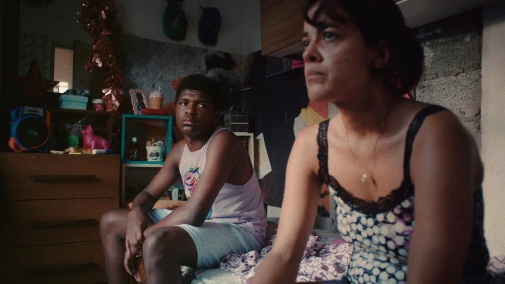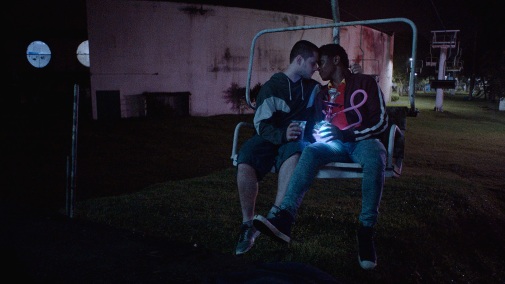TIFF ’23: “Toll” tests the limits of a mother’s love
 Saturday, September 9, 2023 at 8:30AM
Saturday, September 9, 2023 at 8:30AM 
A mother’s love should be unconditional, but so often it isn’t. A mother knows best, except when she doesn’t. With some parents, preconceived notions of who their child should be crash against who their child actually is. Illusions and delusions take their toll and what one person calls love may feel like hatred to the person who endures it. It's easy to follow anger’s siren song, and rage against unfit mothers and ungrateful children, depending on where you fall. Broaching these fraught relationships is risky business for any artist, even those agile in avoiding cliché and melodrama.
Watching Toll, Carolina Markowicz’s follow-up to the acclaimed Charcoal, one can’t help but give thanks that this particular artist took the risk…

In a limbo-like place between the city of São Paulo and the beach, a woman wakes in her lover’s bed. It’s still before dawn, street lights outside whispering golden hues on naked skin, a sleeping body and another making her escape. The camera observes the casual sensuousness of the scene with a curious gaze, eager to capture the beauty and the fluster: a broken bra strap here, a clumsy bathroom ritual there. It follows Suellen, played by Maeve Jinkings, known to many for her collaborations with Kleber Mendonça Filho. Walking along a landscape transitioning from forest to industry, she outpaces the sun, trying to get to work on time.
And yet, despite the haste, Suellen still stops by a makeshift altar to light a candle of virility for her son, Antonio. We soon find out why, after she gets to the freeway toll station where her days drain away and breaks for lunch with Telma, a kind colleague full of unasked-for advice. Pouring over their phones, both women watch, scandalized, as the teen boy livestreams a pink-drenched lipsync on WhatsApp, flaunting his queerness where everyone can see. Shame bubbles inside the single mother in the first of many similar scenes, Telma speaking words of God and promising the church as the path to salvation. Back at home, Suellen can barely look at her son without falling into an argument.
Vicente Saldanha’s production design and Luis Armando Arteaga’s cinematography do wonders to render family strife through visual contrasts, imagining mother and son’s domestic kingdom as a material extension of their conflict. Everything looks colorless in the household, feeble lace butterflies failing to enliven the living room despite it all. Even the light has a tinge of gray as if the constant tropical rain and downcast skies had infiltrated the abode. Only Antonio’s domain differs, a riot of pink and holographic rainbow, CDs plastered over the walls, and a ring light shining bright. At one point, he’ll take a kaleidoscopic fixture to the hallway, turning domesticity into discotheque.
If the gray skies above Suellen follow her inside as if she were Winnie the Pooh’s Eyeore, Antonio’s pink joy travels with him. At one point, both Toll and its leading man look at the world through rose-colored glasses, metaphor made literal as the camera peeks behind the pink lens of his shades. In his eyes, the sky is bubblegum with cotton candy clouds, the steam and smoke spilling from nearby factories rendered in Barbie-core hues. Maybe some of his pink joy rubbed off on Suellen, a rosy manicure adorning the mother’s hands. Then again, maybe not. After all, the nail polish is already flaking, a finger denuded and more to come.

Though she never repudiates realism, such playful detail and audiovisual exuberance do much to elevate Markowicz’s film above similar exercises. And that’s before the writer-director leads Toll down the road of dark comedy, a tonal seizure that would derail lesser projects. The first clue comes in the vivisection of Telma’s religious hypocrisy and morally superior notions. We glimpse her engaging in anonymous sex by the side of the road and, later that day, talking about how she and her husband always celebrate their anniversary at church, God’s blessing essential for a happy marriage – never mind her furtive trysts three times a day, always without condoms because those are anti-Christian.
That’s nothing compared with what’s to come. Influenced by Telma, Suellen decides to sign Antonio into an expensive workshop-style gay conversion therapy program. To pay for it, she’ll help her boyfriend Arauto and his gang rob the rich folk that pass by her toll between the city and their beach houses, starting a domino effect of misfortune that will upend the status quo of her small family unit. That’s more tragedy than comedy, for that later register manifests fully in the misbegotten workshop, led by a Portuguese pastor with very creative ideas on how to de-queer his clients, fattening his bank account along the way.
Played by Isac Graça in Jesus cosplay, the man’s a clown cum cult leader, a spike of stylization within the film’s realist devices that clashes exceptionally well with young Kauan Alvarenga’s sullen demeanor. The whole affair is a circus of discomfort so extreme you can’t help but laugh, from videos of a jockstrapped dancer with a rocket up his ass to PowerPoint presentations about the evil of the anus, some plasticine genitalia somewhere in between. Pastor Isac calls it a bioenergetic resignification process, whatever that might mean, but his assistant has other theories on Antonio. She says the boy must be saved tout de suite because “Satan leases your body until you’re seventeen. After that, it’s Squatter’s Rights.”

When you get to libations of pasteurized cum, it’s hard to imagine any film coming down from this absurdity. It’s testament to the filmmakers’ skill how Toll bounces back and between these mad tonalities. At one point, intercutting between mother and son, you might see Antonio finding love in a hopeless place while his mother careens into oblivion. Their stories rhyme new meanings as they collide, intertwined to the end – an epilogue with lipsyncing and Jinkings’ conflicted face, exposing all the contradictions of a mother’s fear and disgust for and of her son. You laugh until you cry and back again, registering harsh truths about tough love that might not deserve to be called love at all. Throughout, honesty reigns supreme, as does a great sense of place, and when you leave Toll behind, one certainty buzzes sharp in the viewer’s mind – the future of Brazilian cinema is in good hands.


